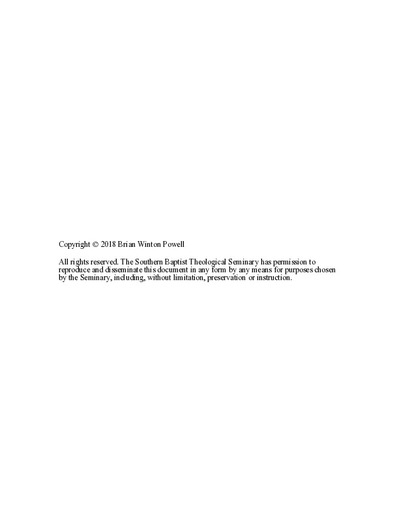| dc.description.abstract | This dissertation addresses the debate over the Bible’s prohibition of same-sex monogamy from a progressive covenantalist approach. This dissertation examines the work of three men who affirm same-sex relationships—David Gushee, James Brownson, and Matthew Vines—arguing that the Bible, when read on its own terms and in its own categories, defines marriage as a created institution expressed in a covenantal and exclusive heterosexual union that finds its typological fulfillment and telos in the Christ-church relationship. Progressive covenantalism provides the best perspective for reading the Bible intratextually and the best grounding for Christian sexual ethics.
Chapter 1 introduces the issues surrounding the same-sex marriage debate. The chapter provides a brief overview of this dissertation’s main conversation partners—Brownson, Gushee, and Vines. This chapter provides a brief survey of evangelical responses to the issue of gay Christianity.
Chapter 2 provides an overview of the exegetical and theological arguments of Brownson, Gushee, and Vines. The chapter also addresses inconsistencies in their doctrine of Scripture, and presents an overview of the biblical storyline from progressive covenantalism.
Chapter 3 examines key biblical passages, particularly Genesis 1–2, from a biblical-theological perspective. The chapter closes with a discussion of marriage, singleness, and typology, proposing progressive covenantalism’s theological method for defining the nature of marriage and human identity.
Chapter 4 briefly critiques both Gushee’s and covenant theology’s methodology in sexual ethics. The chapter gives an overview of Christian ethics formulated from a progressive covenantal perspective.
Chapter 5 examines the issue of same-sex marriage while formulating a doctrine of the image of God. The common evangelical distinctions of same-sex behavior, desire and attraction, orientation, and identity are addressed and critiqued in light of progressive covenantalism. The chapter also addresses local church implications for Christians who experience same-sex attraction.
Chapter 6 provides concluding remarks and summarizes the arguments put forth in this dissertation. The chapter and dissertation conclude by suggesting further topics of study in the realms of both Christian ethics and progressive covenantalism. | en_US |

